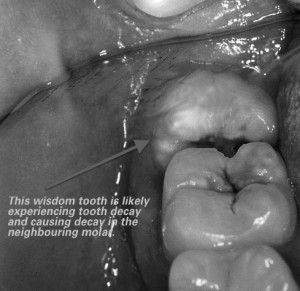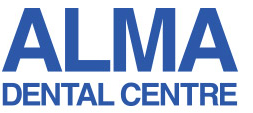Anxiety over wisdom teeth removal is normal.
Worry over third molar, or wisdom teeth surgery is a common theme among patients, so we thought this story might be a helpful read if you are contemplating the procedure. Recently, we had a patient of Alma Dental Centre express concern over removing her wisdom teeth, which she affectionately referred to as “Third Molar Madness”. In this instance, she had two fully-grown wisdom teeth in and two waiting to erupt. What was holding her back from having them extracted was pure fear of surgery and the risk of complications. When her first two wisdom teeth erupted, they bothered her for a short period of time, on and off. Now that they’re fully developed, she barely notices them. In her words: “I only notice them when I’m brushing and try to reach them at the very back, basically jamming the brush into my jaw. “ On the other hand, she told us that her father had all four of his wisdom teeth grow in and never had any significant problems with them. In light of this story, we think it’s important to relay that wisdom tooth extraction is not required for everyone.
Third Molar Madness questionnaire:
1. Is there enough space in your jaw for wisdom teeth to naturally grow without crowding the other teeth? 2. Do you eat a healthy well balanced diet? 3. Do you follow a thorough and proper tooth brushing / flossing routine and are you able to keep the area clean? If you answered yes to all of the above then you could be in the clear. According to a published online study in the American Journal of Public Health, Jay W. Friedman finds the following:
“Most discomfort of erupting wisdom teeth is equivalent to teething and disappears on full eruption. Infection occurs in fewer than 10% of third molars, most of which can be cured with antibiotics, oral rinsing, or removal of excess tissue (the hyperculum) around the tooth, without requiring removal of the tooth itself.”
So when is wisdom tooth removal necessary?
In a previous post on wisdom teeth removal we provided key reasons why you may need to have the procedure done. Here are just a few factors that we consider at Alma Dental Centre: 1. Health of the Second Molar 2. Presence of Gum Disease 3. Risk of Dental Crowding 4. Position of the Mandibular Nerve in Relation to the Wisdom Teeth 5. Angle of the wisdom tooth 6. Patient Age

This wisdom tooth is likely experiencing tooth decay and causing decay in the neighbouring molar as well.
Patient age and wisdom teeth removal
Removing the third molars is not always necessary. Our goal when assessing your wisdom teeth is to determine whether patients will experience complications in the future and discuss possible treatment options. We thought that this Huffington Post article by Ruben Cohen on the topic is an insightful read as well. On the issue of age, Dr. Cohen notes:
“Numerous studies have shown that older adults have a higher risk of having a periodontal defect on the second molar when wisdom teeth are present. (10) The incidence of cavities on wisdom teeth also increases with age. (11) As far as complications after surgery, the risks of post-op complications and recovery time both increase with age, especially in patients 25 years of age and older.”
Wisdom Teeth issues vary from patient to patient. The video below demonstrates various surgical approaches for extraction and recovery. If you are experiencing significant discomfort due to your wisdom teeth, schedule an appointment to learn more about your treatment options.


